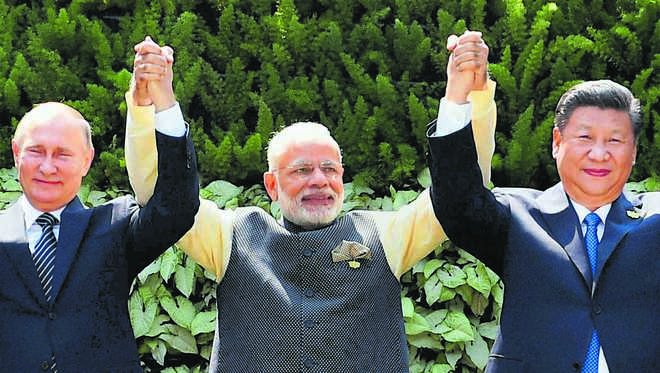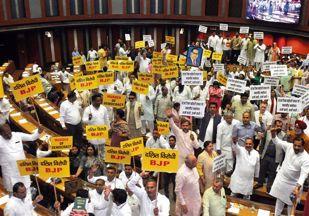
flop show: BRICS meet in Goa exposed the intellectual bankruptcy of the government.
MK Bhadrakumar
FOREIGN policy may wear a deceptive look of continuity, but then, there are defining moments when it dawns that the more things seemed to remain the same, the less they have been so in actual reality. The recently concluded BRICS summit in Goa presented one such defining moment. It became clear through the last weekend following the event in Goa that the foreign policy pursued through the 10-year period of the UPA government (2004-2014) have changed unrecognisably in the limited period of two years since the Modi government came to power.
There cannot be two opinions that BRICS rejected India’s campaign against Pakistan as a ‘state-sponsoring terrorism’. The Goa Declaration dwelt at length on the imperatives of countering the menace of terrorism, but, ironically, Pakistan too could have signed up on that document. There was no reference to cross-border terrorism or state sponsorship of terrorism, leave alone to Pakistan as the ‘mothership’ of terrorism.
The rebuff sullies India’s image. Prime Minister Narendra Modi’s claim to be a rock star on the world stage lies in ruins. Modi not only led the Pakistan-bashing at the summit, but also monopolised the high drama, unwilling to share limelight with the External Affairs Minister, or with the two junior ministers, who were simply detained for protocol duties at Dabolim Airport, all suited and booted.
Clearly, BRICS leaders could see through Modi’s theatrics and took it to be political grandstanding before the domestic audience in India. Indian diplomacy failed to convince them about the Pakistani hand in the Uri attack or the authenticity of the ‘surgical strikes’. More than a month down the line, the Modi government is yet to come up with hard evidence nailing Pakistan, in the absence of which the strikes become a grave violation of international law and human rights. No doubt, the government is acutely conscious of this catch-22 situation, which explains its strange behaviour — running berserk in the cities and towns of Uttar Pradesh with billboards claiming political credit for the strikes, but dodging any official statement that such operations were undertaken across the LoC, as claimed by ‘sources’ briefing the media.
Modi’s performance at Goa will almost certainly close the door on any prospects of improvement of India’s relations with that country so long as he remains in power. But then, it probably suits Modi, too. On an increasingly bleak economic landscape, the Modi government has nothing to show as achievements. Whereas, India-Pakistan tensions are useful to drum up jingoism and galvanise communal polarisation. Key states are heading for polls — Punjab, Uttar Pradesh and Gujarat. Equally, the schedule of elections runs through 2017 and 2018, all the way to the crucial do-or-die 2019 general election.
Suffice it to say, an extremely dangerous period lies ahead for India-Pakistan ties. A senior and political commentator wrote in a leading national daily in the weekend that there is talk that the Modi government may find it expedient to order the Army to stage another ‘surgical strike’ toward the end of the year regardless of Pakistani provocations. This sounds shocking, but then the exigencies of the need to drum up jingoism to garner votes in Uttar Pradesh remain unpredictable. Exploiting foreign policy to boost the image of the Prime Minister has been a trademark of the government.
The BRICS event should not have been treated as an adjunct to Modi’s poll campaigns in the heartlands of India. Such a parochial outlook in the era of globalisation hurts India’s long-term interests. When the then Russian president Dmitry Medvedev first sounded out former Prime Minister Manmohan Singh regarding the idea of BRICS, it did not take a full minute for the latter’s erudite mind to grasp its seamless potential. No matter Russia’s reasons for conceiving such an idea, Manmohan Singh could sense the raison d’etre of such a grouping, and how it could only augment India’s own quest for an equitable world order and a due share in the international financial and political system.
Manmohan Singh could visualise that such a group would be a formidable economic and political force to reckon with, which in no way tied India down to prescriptive approaches or compelled it to amend its national agenda of development. He saw immense potential to develop synergy through such a privileged group to work with China on global problems, which was bound to enhance the climate of trust between the two countries in their endeavour to make the relationship more stable, much as differences and disputes remained. In retrospect, things worked just as Manmohan Singh anticipated, and as the UPA era ended, it became a common refrain at the high-level India-China interactions to affirm that India and China shared more common interests in the contemporary world than the differences that might set them apart.
Why did things go wrong since 2014? First and foremost, Manmohan Singh brought to bear on foreign policy the due intellectual content. He unfailingly related foreign policy to the national strategy. The primacy he attached to economic diplomacy was self-evident. He had no time for brawn, theatrics and bluster. He kept working with the ‘big picture’ in mind. In Goa, India was presented with a splendid opportunity to host the BRICS summit against a backdrop when India had many things to showcase as achievements. Manmohan Singh would have concentrated his formidable brain power on BRICS’ institution building on such vital areas as creating a mechanism for issues relating to non-tariff barriers hurting trade among BRICS countries, easing visa restrictions for businessmen and so on — or for enhancing cooperation in global governance. He would have inherited the impulses of the G20 at Hangzhou and used the Goa summit to raise India’s international stature as well as to attract investments in infrastructure development.
Alas, Modi blew it in Goa. The intellectual bankruptcy of his government and the absence of a ‘big picture’ in the Indian foreign policy calculus in an increasingly multipolar world order got exposed. Modi didn’t have to be a PhD in economics. He simply needed to remember he is India’s Prime Minister and that the country is at a crossroads in world politics. The past one month conveyed an appalling legacy of Modi’s stewardship of foreign policy — displaying discontent at the G20 and becoming a ‘spoiler’, disdainfully ignoring NAM, grievously wounding SAARC, and now virtually threatening BRICS with untimely capsize.
The writer is a former ambassador



























